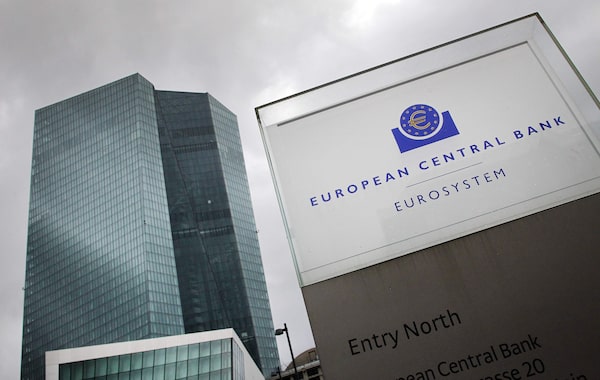
The European Central Bank headquarters, in Frankfurt am Main, western Germany, on Feb. 2.DANIEL ROLAND/AFP/Getty Images
The European Central Bank raised euro zone borrowing costs to their highest level in 22 years on Thursday and said stubbornly high inflation all but guaranteed another move next month and likely beyond that too.
The quarter-percentage-point move was the ECB’s eighth consecutive interest rate hike since it badly misjudged the tenaciousness of price rises early last year, and took its policy rate to 3.5 per cent, a level not seen since 2001.
It came alongside confirmation that the ECB was shuttering its remaining crisis-era stimulus programmes and a surprisingly sharp increase in the core inflation forecasts compiled by the bank’s staff.
“Barring a material change to our baseline, it is very likely the case that we will continue to increase rates in July,” ECB President Christine Lagarde told a news conference.
“Are we done? Have we finished the journey? No. We’re not at our destination. Do we still have ground to cover? Yes, we still have ground to cover,” she said.
The central bank for the 20 countries that share the euro also said it now expected inflation to stay above its 2 per cent target all the way through to the end of 2025.
It raised its 2023 and 2024 projections for “core” inflation, excluding volatile energy and food, which the ECB watches closely. Ms. Lagarde also gave her strongest warning yet about wage rises and companies pushing up prices. “Wage pressures, while partly reflecting one-off payments, are becoming an increasingly important source of inflation,” she said. “Moreover, some sectors have been able to keep profits relatively high.”
Euro zone inflation has been moderating for months, courtesy of lower energy prices and the steepest increase in rates in the ECB’s 25-year history.
But it remains unacceptably high for the ECB at 6.1 per cent, with underlying price growth only just starting to slow despite signs economic growth is stagnating.
The upward revision to inflation forecasts for this year, the next and 2025 – when price growth is still expected to be above the central bank’s target, at 2.2 per cent – surprised economists.
“Inflation forecasts were higher across the board, but they’ve especially increased their core CPI forecast for next year,” Colin Asher, a senior economist at Mizuho, said.
“They are clearly more concerned.”
Euro zone government bond yields and the euro rose as traders priced in a near-certain hike next month and higher rates generally.
While signs that economic growth is slowing would normally augur a pause, the ECB has been taking its own projections with a pinch of salt after years in which they missed the mark.
Instead, rate-setters have focused on actual economic data that have been painting a mixed picture.
Two quarters of contraction in industrial powerhouse Germany dragged the euro zone into a shallow recession last winter and the economy is likely to eke out only modest growth this year.
But unemployment is at record lows and wage growth is picking up, even if it still lags inflation.
Headline price growth has been falling fast after hitting double-digits late last year. But underlying prices, most notably for services, have yet to show the decisive drop ECB policy makers have said they would need to see before taking their foot off the monetary brake.
Higher borrowing costs are curbing demand for credit from households and companies as well as banks’ willingness to lend, but consumption is holding up well in nominal terms.
“The Governing Council’s past rate increases are being transmitted forcefully to financing conditions and are gradually having an impact across the economy,” Ms. Lagarde said.
While the opposing economic factors are likely to have provided ammunition to both sides of the ECB’s Governing Council, the hawkish majority that has been pushing for more rate hikes remain firmly in the driving seat.
“We are not thinking about pausing, as you can tell,” Ms. Lagarde said.